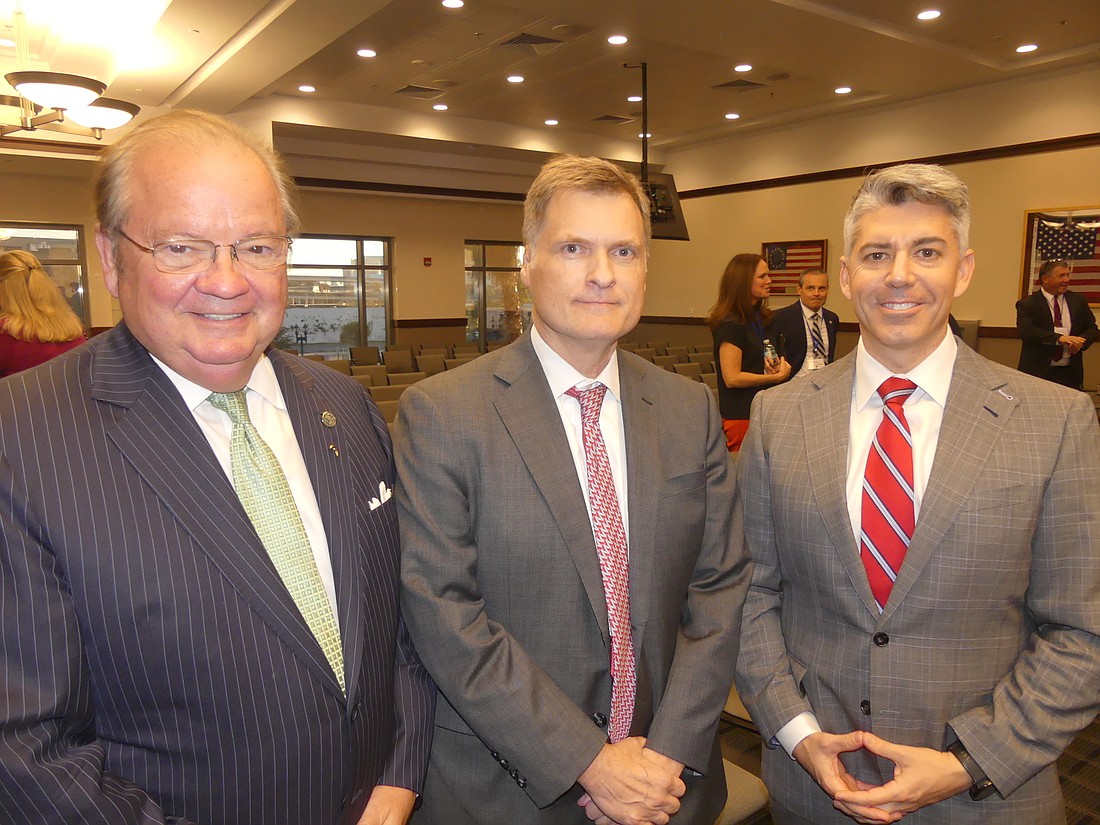
State Supreme Court Chief Justice Carlos Muñiz visited Jacksonville on Oct. 25 and met with the local legal community including law students, local Bar leaders and judges.
His itinerary began with lunch with the Catholic Lawyers Guild at Ruth's Chris Steakhouse, then continued with a tour of the Jacksonville University College of Law.
The day concluded with a reception and meeting at the Duval County Courthouse with the Jacksonville Lawyers Chapter of the Federalist Society.
“We had him booked since June,” said Bryan Gowdy, president of the Catholic Lawyers Guild.
“Justice Muñiz had a Catholic school education from elementary through high school. We are happy he accepted our invitation and our members and guests enjoyed hearing him talk about his faith,” Gowdy said.
Muñiz then toured the JU College of Law where he met the 14 students who began their first year of study in August.
“It’s remarkable that he got to kick the tires at a brand-new law school,” said JU College of Law founding Dean Nick Allard.
Muñiz, who graduated from the University of Virginia and Yale Law School, talked to the students about his legal career, including being a clerk for two federal appellate judges.
“That is a great way to develop a relationship with someone who can be a mentor,” Muñiz said.
Before joining the state Supreme Court, Muñiz was a member of U.S. Education Secretary Betsy DeVos’ staff as the presidentially appointed, Senate-confirmed general counsel of the Department of Education.
Muñiz, 52, also has extensive experience in state government.
He was the deputy attorney general and chief of staff to Florida Attorney General Pam Bondi; deputy chief of staff and counsel in the Office of the Speaker of the Florida House of Representatives; general counsel of the Department of Financial Services; and deputy general counsel to former Gov. Jeb Bush.
“I loved the federal jobs, but I encourage you to keep in mind state service. Some of the happiest people I know are state attorneys and public defenders,” Muñiz said.
Appointed to the state Supreme Court by Gov. Ron DeSantis in January 2019, Muñiz is the 89th justice on the bench since statehood was granted in 1845.
He was unanimously elected chief justice by his colleagues on the state’s highest court in March and began his two-year term July 1.
“Be thoughtful about your strengths and weaknesses. Do what you think is valuable and important. The people who are the best at what they do are people who have a passion,” Muñiz advised the students.
After touring the courthouse and the 4th Judicial Circuit’s law library where JU law students have unlimited access, Muñiz attended a reception and Q&A session with about 100 members and guests of the Federalist Society’s Jacksonville chapter.
Asked by chapter President Patrick Kilbane what led him to pursue a seat on the bench, Muñiz said growing up in Virginia, near Washington, D.C., immersed him in public policy.
“I have always had an interest in constitutional law,” Muñiz said.
Commenting on his judicial philosophy, Muñiz said the late U.S. Supreme Court Justice Antonin Scalia was an influence.
“In college, I was interested in the role of the court. Throughout American history, the supreme court has been a source of controversy. I was fascinated by that,” he said.
“I put myself in the originalist and textualist camp. That is most consistent with democratic values. Justice Scalia put a lot of ideas out there.”
After investigation by staff at The Florida Bar, the state Supreme Court administers attorney disciplinary proceedings when a complaint is made against a lawyer.
“I doubt it is anyone’s favorite part of the job, but it’s important. The purpose is to protect the public and preserve the integrity of the profession,” Muñiz said.
The public’s interest also is a priority when it comes to amending the rules governing judges and attorneys, Muñiz said.
“The constitution gives us the responsibility to make or change rules. There is a process in place to give people the opportunity to weigh in on issues. The public input process is genuine. We listen carefully and we appreciate the arguments. We care about getting it right and we know public input is part of getting it right,” he said.